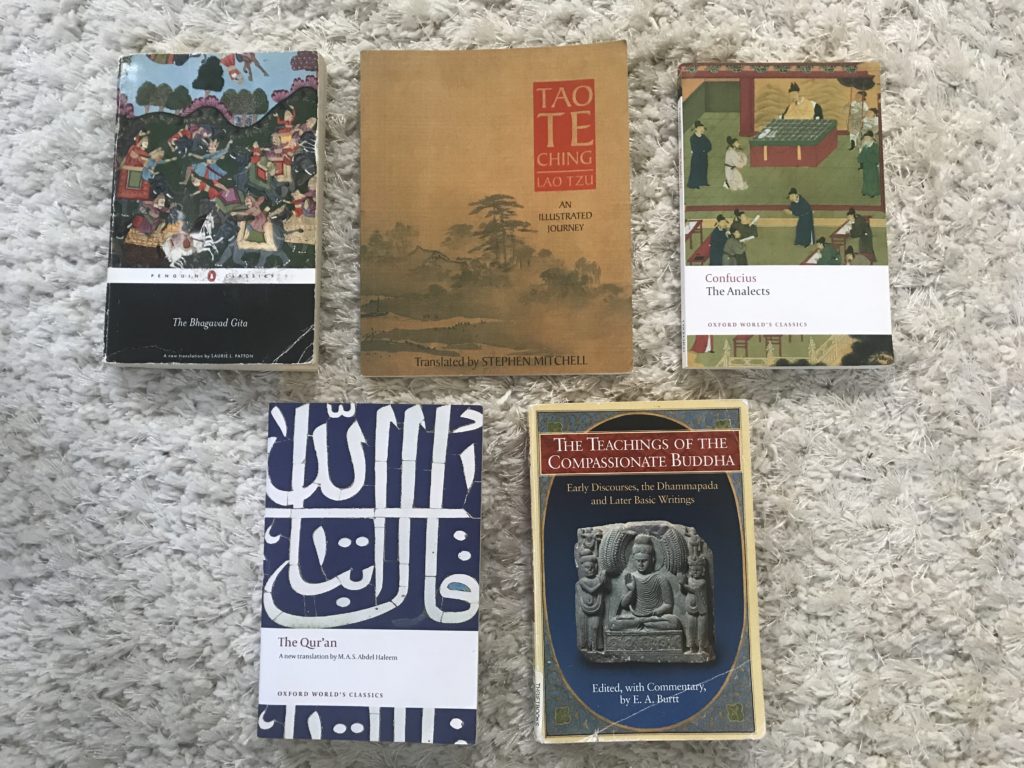5 attributes of Eastern religions

What are the Eastern religions like, and how are they different from Christianity? Here are 5 attributes of Eastern religions to help you understand the difference–and the conflict–between Eastern religion and the Christian faith.
“What’s the difference between my Hindu friends who do good things and me? I believe in Jesus, but it seems that everything else we do is the same. I don’t know what to tell them.”
–an Indian man, at church on Sunday
This is a good question–with a complex answer. The Eastern religions are multi-faceted, each one with multiple sacred texts and factions with various beliefs. But I think for the average person, the Eastern religions can be boiled down into 5 similar characteristics to help you see the main differences between Christianity and Eastern religion/philosophy.
Admittedly, I’m not an expert—and I didn’t sleep at Holiday Inn last night—but I did take a graduate class last summer on the major Eastern religions of the world, and I have read the major ancient sacred texts. And I’m willing to write about it and try not to bore you.
I studied Islam, Buddhism, Hinduism, Taoism, and Confucianism. And I read The Qur’an, The Teachings of the Compassionate Buddha, The Bhagavad Gita, The Tao Te Ching, and The Analects. If you decide to read these, use a highlighter and keep asking yourself questions like What is being advocated here? What does this actually mean, spiritually? Who is responsible here, and for what? What does this say about people or God? Remember, these are the writings of individuals and their beliefs about spirituality and philosophy of Eastern life.
Although these texts aren’t easy reading, I appreciated the requirement to read them. How else could I make informed statements about Krishna or Muhammed?
I stayed curious. After all, billions of people base their lives and their eternities on what’s written here (even though most probably haven’t read them). It makes sense to find out why.

The end result: I have a better cultural and theological understanding of the Eastern world. Although I heartily disagree with their religious beliefs, I have an appreciation for their quest for spiritual understanding and peace.
Christianity began as an “Eastern religion”–it is from Palestine–but it differs from the other Eastern religions in several ways. Anyone who thinks that Christianity and Buddhism are basically the same should look at them separately. And read what they actually say–not what people have said they said.
To start, let me clarify one thing first for Western readers: Eastern religions are not the yoga-inspired versions that Americans currently embrace. There is an appeal for all of us, certainly, to live peaceably and minimize clutter. We love the idea of acceptance, self-awareness, and self-assessment. A life without greed and ambition: just kindness. These are all good things.
But these ideals are not actually the core of Eastern religious thought. These ideals are all talked about in the Bible, also. (The Apostle Paul called it the war between the flesh and the spirit, or human nature striving against its spiritual nature.) These texts, like any religious material, will discuss aspects of human nature and destiny. The quest to understand and reconcile the human condition to a particular standard is what separates one belief system from another. The solution should offer hope, peace, mission, and relationship with God.
In a nutshell, these are the major hallmarks of Eastern religion:
- Presuppositions in Eastern thought come from an honor-based/shame-based culture, not an ethics/truth-based foundation. Eastern thought lacks definitive rights and wrongs in the way we understand right and wrong in the West because Eastern cultures stress decisions in light of honor/shame. Relatively speaking, many things are acceptable if it honors the individual, the family, or the worship of a god. Westerners are modernizing this thought also (it’s called relativism): anything is acceptable if there’s a good reason for doing it. But that’s definitely not Christianity, either.
- Love is conditional. Shame and disrespect give someone the right to withdraw or withhold love from others (and in the case of Islam, for Allah or his prophets can withhold love from people). Islam claims that Allah shows love and mercy, yet the Qur’an shows Allah favoring those who obey him completely and explicitly while allowing for torture and death to infidels–no second chances. Other religions don’t speak of love at all, only self-improvement, karma, dharma, and punishment. There is a complete lack of patience, long-suffering, grace, and mercy in Eastern thought. There is no eternal love story the Eastern religions. Only Christianity teaches that God loved everyone enough to sacrifice for them, to take their sin and shame and redeem it. There is no other story like this on earth.
- Death and life are cyclical through reincarnation or samsara, as determined by life’s actions/karma. The desired reality (a kind of heaven) is called nirvana, Brahama, Botthisatttra, Tao, or self-actualization (depending on the religion). This perspective makes death and life unimportant, except to better your chances in the next life. Human life in general becomes easily-dispensable. People endure suffering in hopes of improving their next existence.
- God exists in three persons, as the Trinity. This concept is inconceivable to Eastern thought, even to Muslims who believe in God (Allah). Pantheism and nihilism are much easier to swallow that one God who exists and manifests himself in three persons.
- Jesus is not God’s Son. He did not die and rise from the dead. God is not personal. While some religions call Jesus a prophet (Islam acknowledges this), Jesus is not considered to be God’s son. NOTE: The theology of Jesus is the cornerstone for the Christian gospel and the breaking-off point for all cults and work-based religions. This belief alone separates the Christian faith from all others.
- With the exception of Islam (monotheistic), Eastern religions do not ascribe to one God. Their options for deity are:
- many gods (polytheistic)
- god is in everything (pantheistic)
- god is within each person (humanism/self-actualization)
- there is no god (nihilism)
So, if you’re talking about religion with someone, don’t carry on a debate. Certainly, you can study how the various religions differ from one another and have a conversation. But even better, just ask this important question:
What about Jesus?
Determine if the religion claims that Jesus is a man, a prophet, a god, or a risen Lord. Then you will be able to figure out what to do about the rest of it.


The Conversation
Wrong! Buddhism absolutely requires honesty and ethics not your BS “shame” narrative…I could go on but you really should retitle this since you made it into Christian attributes by number 3.
But better yet, delete this or suggest people do their own study as I’m guessing your “honors study” must’ve taken place at Bob Jones or Oral Roberts Universities.
Mike,
Thanks for writing. I’m sorry my communication and perspective offended you. I will try to communicate with more grace and clarity in the future. I have studied Buddhism as well as Christianity, although not as deeply, since I never wanted to become a Buddhist. Yes, Buddhism values being good and doing good, which is wonderful. However, without a “true north,” how can goodness absolute or relative? (This is one of the problems in modern America–there are few absolute truths about what is good and what is actually wrong.) What can being good promise a person without any definition or moral absolutes? Siddartha Gautama was certainly a wise and good man, a philosopher who believed in permanence of the soul. But did he conquer death himself? Did he promise eternal life or prove that it could be achieved? Did he promise hope in the midst of suffering, live it out, and die for the salvation of the world–people who had the option to choose him or reject him? I personally choose to believe the historical record of Jesus Christ’s teachings, followers, life, and resurrection. As far as “shame” goes, I was not implying that Buddhists should be ashamed of themselves or are shameful because of what they believe. I was speaking of the authentic culture of Eastern religions, which is a known fact by any philosopher or religious student/teacher. All of Asia is an honor/shame culture. Do you know any Indians or Chinese who live in China or India or come from those places?–They can explain that their religion and their entire way of life is based on honor/shame, not right/wrong. I’m not saying American culture is better! No, Western culture keeps redefining what is “good” so we don’t feel guilty and so we can retain our entitled independence about everything. Honor/shame cultures, however, revolve around a different narrative, one of honoring the family and making decisions that don’t bring them shame (shame–like converting to Christianity or another “immoral” action) will likely bring consequences like removal from the family, death, etc.). I’m impressed that you’re up to speed on some of the the fundamentalist Christian universities, but no, I did not learn any of this from Bob Jones or Oral Roberts. I have found that my best learning occurs through reading the Bible myself. Any manuscript that has endured thousands of years, was written by over 40 different writers (in different countries and in 3 different languages) over a span of 1500 years, in multiple genres–and it still beautiful, unified, thematic, inspiring, and yet does not contradict ITSELF–MUST BE worth reading and considering. For thousands of years, people have fought wars over the Bible’s truths & Jesus’ radical teachings, people have been martyred for their beliefs in him; yet the Bible has preserved and translated at the risk of people’s own lives. Persecution began in Jerusalem with Jesus’ illegal execution, then spread to ancient Rome and continued in Europe and the rest of the world. 56 countries today that still outlaw it. Yet it can’t be stamped out. Why would people work so hard to eradicate it? Why would people die for it and for their beliefs in Jesus, the central figure and theme of the whole book? The Bible is still the biggest bestseller of all time. Why? It makes no sense if the Bible does not contain power and authority to change lives. I’m happy to continue the conversation. Email me any time at sueschlesman@gmail.com.